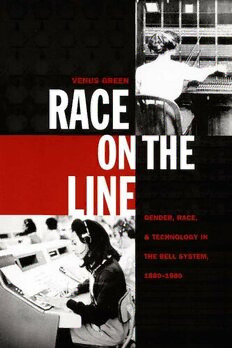
Race on the Line: Gender, Labor, and Technology in the Bell System, 1880–1980 PDF
Preview Race on the Line: Gender, Labor, and Technology in the Bell System, 1880–1980
RACE ON THE LINE duke Durham university and London press 2001 RACE Gender, Labor, and Technology ON THE in the Bell System, 1880–1980 LINE Venus Green ∫ 2001 Duke University Press All rights reserved Printed in the United States of America on acid-free paper $ Designed by Rebecca M. Giménez Typeset in Scala with Franklin Gothic display by Keystone Typesetting, Inc. Library of Congress Cataloging-in- Publication Data appear on the last printed page of this book. Acknowledgments for the use of copyrighted material appear on page 371, which constitutes an extension of the copyright page. To my mother, Dorothy Lee Jones and to my dearest friend, Mamadou Bathily CONTENTS Preface | ix Acknowledgments | xiii Introduction | 1 PART 1: THE BEGINNINGS OF TELEPHONY 1 ‘‘Hello Central’’: The Beginning of a New Industry | 11 2 ‘‘Hello Girls’’: The Making of the Voice with a Smile | 53 3 The ‘‘Ladies’’ Rebel: Unions and Resistance | 89 PART 2: THE DIAL ERA, 1920–1960 4 ‘‘Goodbye Central’’: Automating Telephone Service | 115 5 The Bell System Family: The Formation of Employee Associations | 137 6 The Dial Era | 159 PART 3: THE COMPUTER ERA 7 Racial Integration and the Demise of the ‘‘White Lady’’ Image | 195 8 Black Operators in the Computer Age | 227 Epilogue | 258 Notes | 265 Selected Bibliography | 339 Index | 351 PREFACE In the fall of 1973, I became disillusioned with a job in pub- lishing that I had thought would provide an opportunity for me to express my creativity and advance my career. Instead, I found myself in a status-inflated, low-paying clerical job that brought lit- tle recognition and no respect. My decision to leave was sealed after my boss was insensitive enough to send me to cash her paycheck, which was more than twice the amount of mine. A few days after this incident, I visited my old school (Hunter College) where I discovered that a few days earlier one of my classmates also had visited—dressed in jeans, construction boots, and a toolbelt. She worked at the telephone company, repairing telephones. I thought that a job like hers would be a good one to have. I do not recall exactly what I told the New York Telephone Company personnel people, but I am sure that I said I wanted a job where I would not have to type. After a series of tests, I was o√ered a job as a ‘‘switch- man.’’ Although I had no idea of what ‘‘switchmen’’ did, I immediately accepted the o√er based on the salary, which was significantly higher than what my publishing job paid. And typing was not required. I had been a student/community activist, marched in countless dem- onstrations, participated in boycotts, strikes, and other job actions in dif- ferent workplaces, and certainly considered myself a feminist. However, I was not making an overt political statement when I accepted this job o√er. I did not realize that I was one of the first hundred or so women to enter the male-dominated field of telephone switching in New York City. At the time, I was conscious of my own resistance to ‘‘women’s work,’’ and I was vaguely aware of the at&t case that had opened male-dominated work to women. But I certainly had not specifically connected my employment with the eeoc/at&t litigation. Aside from women’s general struggle for
